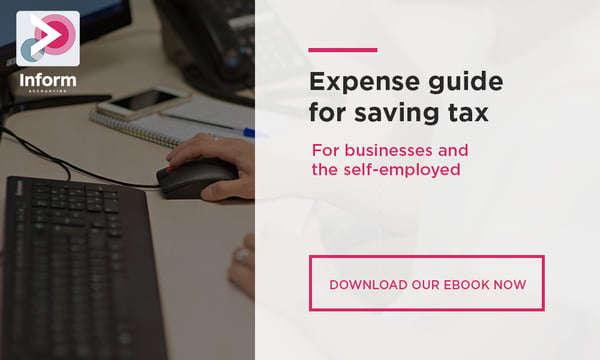BLOG
Paying yourself a salary: What are the most tax efficient options for limited company owners?

If you’re a director-owner of your own limited company though, you can pay yourself a regular salary with relative ease. The real question is how to do it in the most tax efficient manner.
In this blog, we’ll look at the best ways for business owners to extract money from their limited company - and why you should take a salary even if you don’t need it…
Why a small salary is better than none
Most self-employed workers need to get money out of their business on a regular basis, in order to cover life’s expenses.
But even if you’re in the fortunate position of having plenty of money in the bank, there’s still good reason to take a salary rather than leave the money in the business.
A PAYE salary counts towards your allowable business expenses, and as a result, it reduces your end-of-year corporation tax bill. Of course, you’ll have to pay income tax on the salary you take - but with a personal allowance of £12,500 before you actually become liable, a small salary can be taken without any tax liability at all.
What’s more, by taking a salary above the ‘Lower Earnings Limit’ (currently this is a shade over £6,000) you’ll also accrue qualifying years towards your state pension.
So, for most people, a salary of between £6,000 and £12,5000 would actually be more tax efficient than not taking a salary at all.
Taking a salary at the lower end of this scale also means you’ll avoid having to pay National Insurance contributions - as the NIC ‘Primary Threshold’ (at which you start paying contributions) currently stands at £8,632.
The benefits of taking a higher salary
It’s all very well extolling the benefits of a low, tax-free salary - but in reality, not many self-employed workers will be able to live on such modest income.
Depending on the profit levels in your limited company, you may be able to supplement your salary with tax-efficient dividends (more on that shortly) - or, you can simply pay yourself a higher salary and accept the income tax bill that comes with it.
The good news is that there are some benefits to taking a higher salary, too.
For instance, taking a ‘proper’ salary means maximising your annual tax-free personal allowance. It also ensures that you can show adequate earnings when applying for a loan or mortgage - with lenders often unsympathetic to a low salary, regardless of the reasons for it.
What’s more, female directors paying themselves a ‘proper’ salary (and therefore paying National Insurance contributions), are more likely to qualify for maternity benefits. Rules stipulate that to qualify for a maternity allowance, you must have paid National Insurance for at least 13 of the 66 weeks before your baby's due.
A fuller salary can also impact the cover you receive under personal health insurances (or similar policies), which are typically calculated according to income.
Paying yourself in dividends
Often, the most tax efficient way to take money out of your limited company is through a combination of salary and dividends.
Dividends are effectively a share of the business’s profit, and can be ploughed back into the company or distributed to shareholders (just you, if you’re the sole owner of the business).
There’s an administrative process behind the issuing of dividends, but most modern accounting platforms make this a formality.
It’s important to note that dividends do not count as a business expense, so won’t cut your corporation tax - and indeed, dividends can only be paid if there is sufficient profit left in the business after tax has been calculated and paid.
However, income from dividends is taxed at a lower rate than salary income, which makes it a great way to increase earnings without increasing your liability.
Basic-rate taxpayers pay just 7.5% on dividends, and higher rate taxpayers 32.5%. You can also take £2,000 in dividends each year entirely tax free, in addition to your personal tax allowance of £12,500.
In effect then, a combination of salary and dividends affords you an income of £14,500 before any tax liability is accrued.
By topping up these earnings with further dividends of up to £35,500 (the threshold for basic-rate tax payers is £37,500, including the £2,000 allowance), you could take as much as £50,000 home with a personal tax bill of just over £2,662.50.
In summary…
While everyone’s situation will be different, combining salary and dividends is typically the most tax efficient way to draw money from your limited company - allowing you to take a regular wage while making the most of your tax-free allowances.
If you’d like to discuss your own circumstances in more detail, give us a call on 0121 667 3882 or email us at hello@informaccounting.co.uk and one of our experts will be more than happy to help.
Read more of Inform's tax blogs:
Four key cashflow issues that could cripple your business (and how to avoid them)...
Get paid to switch your business bank account
How, when and why your business needs to register for VAT....
IR35 (off-payroll working)- small businesses exempt
Do you own property personally? If so you need to read this...




.jpg?width=1500&height=1000&name=amy-hirschi-K0c8ko3e6AA-unsplash-(5).jpg)

